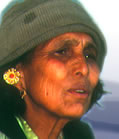THEMES IN THIS
TESTIMONY
Economics

Education

Employment and Income

Identity

Click on arrows
to find more
testimonies
featuring
these themes
|
|
Sex
|
male
|
|
|
Age
|
22
|
|
|
Identity
|
Hindu, Sarki caste
|
|
|
Occupation
|
farmer
|
|
|
Location
|
Ichok VDC, Sindhupalchok
|
|
|
Date
|
1994
|
|
summary
This is a relatively short interview, with brief answers by the narrator in response to mostly closed questions by the interviewer. The narrator does not notice much discrimination from the Chhetri and Brahmins, because “people are busy in their own homes”. Differences between lower castes is limited to festivals and ceremonies – “otherwise, when they are out, they do not practise such things anymore”. Although he cannot think of a way of ending the discrimination that does exist, he believes in equality: “everybody should be put under one roof, because everybody bleeds red from the cut”.
He expresses despair at his own situation saying, “How can I have a better life if whatever I earn is spent by eating food only?” He describes the stress of trying to provide for your family: “If the sahu's (money lender’s) children eat something our children start to cry, we have to give him the same, so if you don't have you have to borrow”. Yet he still feels life has improved: “It is good these days because these days the sahus can't suppress the poor like before.”
detailed breakdown
|
You will need a password from Panos to view the full
transcript of the interview. To apply for a password, click here.
Once you have a password, click here to go to the beginning
of the transcript. You can also click on any section of the
breakdown of content below and go straight to the
corresponding part of the transcript.
|
| Section 1-2 |
Description of father’s troubles with indebtedness to sahu. Mentions difficulties of raising children and support from other villagers for his marriage.
He missed out on education because family was very poor, and father died: “I can't read…I was looking after the animals at my uncle's place to feed myself.”
Describes high levels of interest on the leased land he uses.
He was supported by community in claim for support after earthquake.
He leases land from the Sherpas which was given to him because it was dry.
|
| Section 3-4 |
Explains relationship between livelihood from the land and from other sources (load carrying). He notes gendered wage differences and interest rates.
Loans are needed in rainy season when they cannot carry loads for wages and these loans are used for medical treatment and for grain.
Although he is a Sarki he is not working with leather because“my father didn't teach me, he was old and he died. It's not really needed in the village too.”
Doesn’t see discrimination from the high castes to those lower than them, while differences between lower castes are limited to festivals.
|
| Section 5 |
Talks about dependence on sahus and despairs at his situation and lack of options, inability to improve situation.
Decision to limit family due to circumstance but imperative to have a son. Believes his wife should take responsibility for family planning.
|
| Section 6 |
Sees life as better than in the past, due to controls on sahus.
He believes providing the poor with goats and the capacity to keep them would be a first step to a way out of poverty.
|
|


